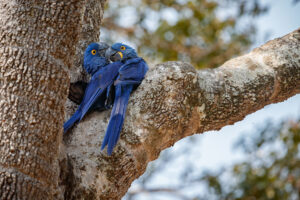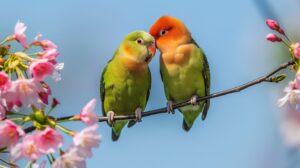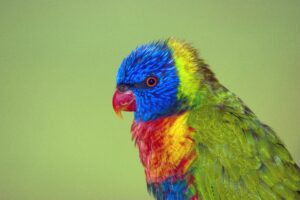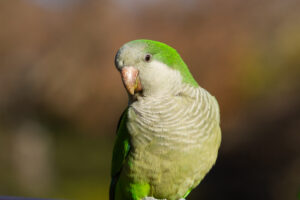Are you a proud macaw owner? These magnificent, colorful parrots bring joy and vibrance to our lives, but their health and longevity depend greatly on one critical factor: their diet. Despite our best intentions, many macaw owners unknowingly make serious mistakes when it comes to their macaw diet. Today, we’re uncovering five shocking dietary errors that could be harming your feathered friend’s health right now.
As experienced avian specialists at PetsPump, we’ve seen firsthand how proper nutrition can transform a macaw’s health, behavior, and lifespan. This comprehensive macaw feeding guide will help you avoid common pitfalls and create the optimal macaw diet plan for your colorful companion.
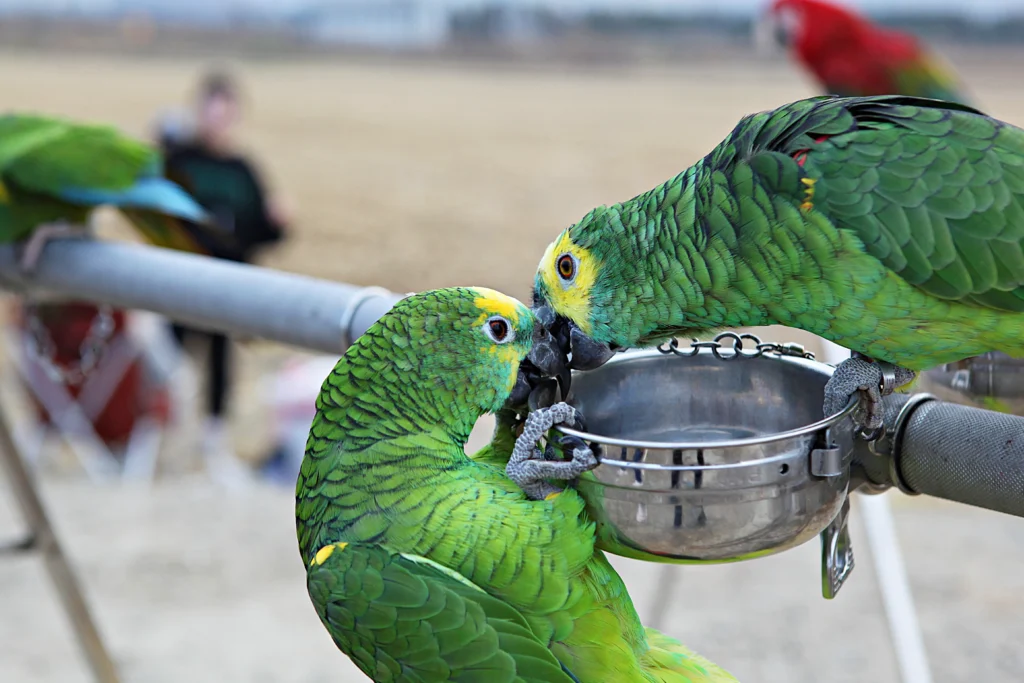
Table of Contents
- Mistake #1: Seed-Heavy Diets
- Mistake #2: Limited Variety in Fruits and Vegetables
- Mistake #3: Ignoring Proper Pellet Selection
- Mistake #4: Unknowingly Offering Toxic Foods
- Mistake #5: Inconsistent Feeding Schedule
- The Ideal Macaw Diet Plan
- Nutritional Needs by Macaw Species
- FAQ About Macaw Nutrition
Mistake #1: Seed-Heavy Diets
Many first-time macaw owners fall into the seed trap. While wild macaws do eat seeds as part of their natural diet, captive macaws need a much more balanced approach to their nutrition. A macaw diet that relies too heavily on seeds can lead to severe health problems.
Why Seeds Alone Are Problematic
Seeds are high in fat but lack many essential vitamins and minerals your macaw needs. A seed-dominant diet can lead to:
- Obesity and fatty liver disease
- Vitamin A deficiency (common in macaws)
- Calcium deficiency leading to weak bones and eggbinding in females
- Shortened lifespan
- Dull, unhealthy feathers
What do macaws eat in the wild? They forage for a diverse range of foods including nuts, fruits, berries, vegetation, and occasionally insects. This varied diet provides balanced nutrition that a seed-only regimen simply cannot match.
Better Alternatives to Seed-Heavy Diets
The best food for macaws should include high-quality pellets as a foundation (40-50% of the diet), supplemented with fresh fruits, vegetables, nuts, and limited amounts of seeds. This mimics the nutritional variety they would naturally seek in the wild.
“Transitioning your macaw from seeds to a balanced diet can be challenging but is absolutely essential for their long-term health,” notes Dr. Sarah Collins, avian veterinarian at the Exotic Bird Sanctuary. “Be patient and persistent—their life depends on it.”
Learn more about proper bird nutrition on our comprehensive guide.
Mistake #2: Limited Variety in Fruits and Vegetables
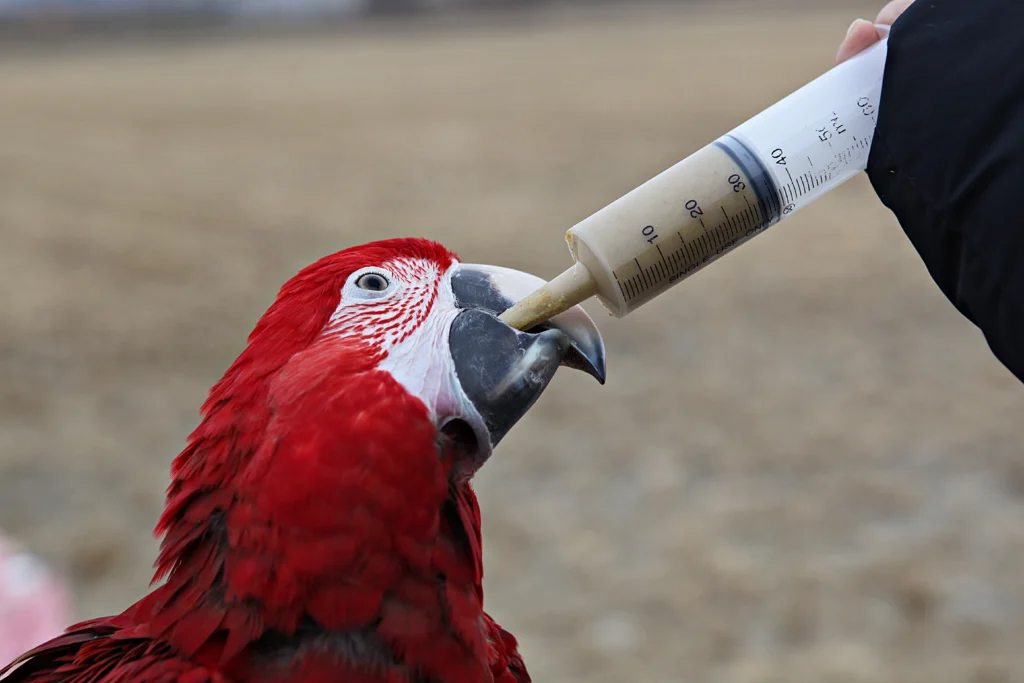
Another common error in a macaw diet is offering only a narrow selection of produce. Just as humans need variety in our diets to obtain different nutrients, macaws thrive when given diverse fruits macaws can eat and vegetables safe for macaws.
The Importance of Variety
A diverse selection of fresh produce should make up about 30-40% of your macaw diet. This variety ensures they receive different vitamins, minerals, and antioxidants essential for:
- Immune system function
- Proper growth and development
- Vibrant feather coloration
- Eye health
- Reproductive health
Fruits Macaws Can Eat
Incorporate these nutritious fruits into your macaw food list:
- Apples (seeds removed)
- Bananas
- Berries (strawberries, blueberries, raspberries)
- Mangoes
- Papayas
- Melons
- Pears
- Oranges and other citrus (in moderation)
- Pomegranate
- Kiwi
Vegetables Safe for Macaws
For optimal macaw nutrition, regularly offer these vegetables:
- Dark leafy greens (kale, spinach, collard greens)
- Bell peppers (all colors)
- Carrots
- Sweet potatoes
- Broccoli
- Butternut squash
- Pumpkin
- Zucchini
- Snap peas
- Cucumber
Many macaw owners make the mistake of feeding only one or two favorite fruits or vegetables. While your bird may have preferences, it’s important to continually introduce new options to ensure balanced macaw nutrition.
According to our comprehensive bird feeding guide, you should aim to offer at least 7-10 different produce items weekly to maintain optimal macaw diet variety.
Mistake #3: Ignoring Proper Pellet Selection
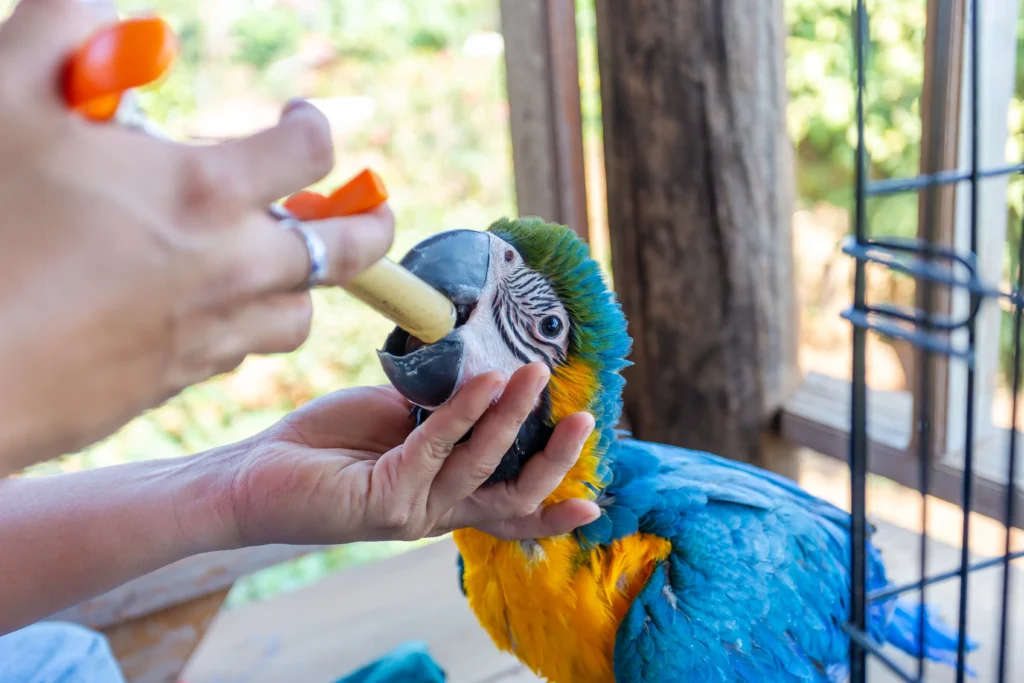
Many macaw owners underestimate the importance of high-quality macaw pellet food as the foundation of a healthy diet. Not all pellets are created equal, and choosing the wrong type can significantly impact your bird’s health.
Why Pellets Matter
Quality pellets should form 40-50% of your macaw diet because they:
- Provide consistent nutrition with every bite
- Are formulated to meet essential vitamin and mineral requirements
- Help prevent selective eating behaviors
- Can be formulated for specific life stages or health needs
Common Pellet Mistakes
When selecting macaw pellet food, avoid these errors:
- Choosing artificially colored pellets – Bright dyes can cause health issues and are unnecessary for your bird
- Selecting the wrong pellet size – Macaws need appropriate-sized pellets for their larger beaks
- Ignoring ingredient quality – Some lower-quality pellets contain fillers and preservatives
- Not transitioning properly – Many owners give up too quickly when birds resist the new food
Selecting the Best Pellet Food
Look for these qualities in best food for macaws pellet brands:
- Natural ingredients without artificial colors or flavors
- Appropriate size for macaws
- Formulated specifically for large parrots
- No added sugars or unnecessary fillers
- Fortified with essential vitamins and minerals
According to avian nutrition specialist Dr. Michael Green, “A high-quality pellet should form the nutritional foundation of every macaw diet plan. I recommend brands that use natural ingredients and avoid artificial colors, as these provide the best nutritional profile without unnecessary additives.”
Check out our detailed comparison of premium bird pellets for specific brand recommendations.
Mistake #4: Unknowingly Offering Toxic Foods
One of the most dangerous mistakes macaw owners make is feeding toxic foods for macaws without realizing the potential harm. Even common household foods can be deadly to your colorful companion.
Foods to NEVER Include in a Macaw Diet
Remove these dangerous items from your macaw food list:
- Avocado (contains persin, toxic to birds)
- Chocolate (contains theobromine)
- Caffeine (coffee, tea, energy drinks)
- Alcohol (even small amounts)
- Onions and garlic
- Salt and high-sodium foods
- Apple seeds, cherry pits, and other fruit seeds containing cyanide
- Rhubarb
- Mushrooms
- Processed or sugary human foods
Many first-time owners don’t realize that even small amounts of these foods can cause serious illness or death in macaws.
Hidden Dangers in Your Kitchen
Be cautious of these less obvious hazards:
- Nonstick cookware when overheated releases fumes toxic to birds
- Some houseplants can be poisonous if your macaw flies freely
- Certain spices and seasonings may cause digestive upset
- Moldy foods can contain dangerous mycotoxins
Your macaw diet should be carefully monitored to avoid accidental exposure to these dangers. Create a safe food preparation area specifically for your bird’s meals to prevent cross-contamination.
For a complete list of foods to avoid, visit our detailed guide on toxic foods for pet birds.
Mistake #5: Inconsistent Feeding Schedule
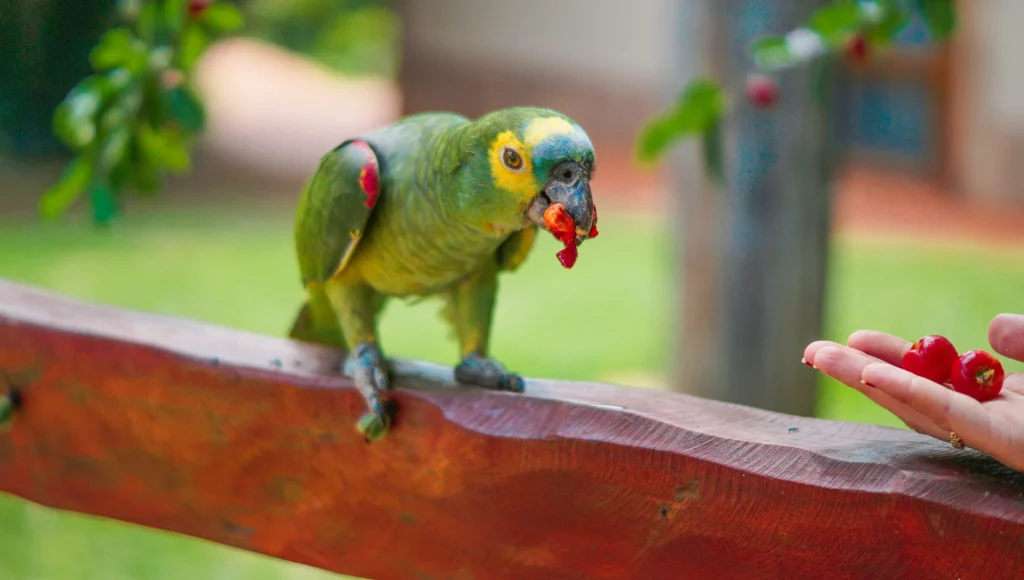
Many owners underestimate how crucial a proper macaw food schedule is for their bird’s overall health and psychological well-being. Irregular feeding patterns can lead to behavioral issues, nutritional imbalances, and even health problems.
Why Consistency Matters
A regular macaw food schedule helps:
- Establish healthy eating patterns
- Reduce food aggression and hoarding behaviors
- Create security and reduce stress
- Aid in proper digestion
- Make it easier to monitor food intake and health
Creating an Optimal Macaw Food Schedule
For the best daily diet for macaw companions:
- Morning feeding (7-8 AM): Fresh pellets and a small portion of fruits
- Midday refreshment (12-1 PM): Replace uneaten food with fresh pellets and vegetables
- Evening meal (5-6 PM): Fresh pellets and remaining portion of fruits/vegetables
- Evening clean-up: Remove perishable foods before bedtime
Adjust timing to your schedule, but maintain consistency. Your macaw will quickly learn when to expect meals and develop healthier eating patterns.
According to animal behaviorist Dr. Jessica Martinez, “Macaws thrive on routine. An established macaw food schedule not only ensures proper nutrition but also contributes significantly to their psychological wellbeing and can reduce problem behaviors.”
Learn more about establishing healthy routines in our bird behavior guide.
The Ideal Macaw Diet Plan
Now that we’ve covered the common mistakes, let’s outline what an optimal macaw diet plan should look like. This balanced approach ensures complete macaw nutrition while keeping your bird engaged and satisfied.
The Perfect Macaw Diet Breakdown
- 40-50% High-quality pellets: The foundation of your macaw diet
- 30-40% Fresh fruits and vegetables: Provide variety and essential nutrients
- 10-20% Healthy nuts and seeds: As treats and training rewards
- Occasional healthy treats: Cooked whole grains, legumes, limited natural human foods
Sample Daily Diet for Macaw
Here’s what a daily diet for macaw might look like:
Morning:
- 1/4 cup appropriate pellets
- 2-3 tablespoons fresh fruit mixture (papaya, apple, berries)
- Fresh, clean water
Midday:
- Refresh pellets as needed
- 2-3 tablespoons vegetable mixture (leafy greens, bell peppers, carrots)
- Fresh, clean water
Evening:
- Refresh pellets as needed
- Small portion of nuts or seeds (6-8 almonds or walnut pieces)
- 1-2 tablespoons additional vegetables
- Fresh, clean water
This macaw diet plan provides balanced nutrition while offering engaging variety. Adjust quantities based on your specific macaw’s size, age, and activity level.
Homemade Food for Macaws
Many dedicated owners enjoy preparing homemade food for macaws as part of their diet. When done correctly, these can be nutritious additions to your macaw food list:
Healthy Macaw Breakfast Mix:
- 1/4 cup cooked quinoa
- 1 tablespoon chopped walnuts
- 1 tablespoon diced apples
- 1 teaspoon flaxseed
- Sprinkle of cinnamon
Veggie Power Blend:
- 2 tablespoons steamed sweet potato
- 1 tablespoon chopped kale
- 1 tablespoon diced bell peppers
- 1 teaspoon sprouted lentils
- Small pinch of turmeric
These homemade food for macaws recipes can supplement commercial pellets but should not replace them entirely. Homemade diets alone risk nutritional imbalances unless carefully formulated with veterinary guidance.
For more homemade food for macaws ideas, check out our creative bird recipes.
Nutritional Needs by Macaw Species
Different macaw species may have slightly different nutritional requirements. Understanding the specific needs of your macaw species can help you fine-tune their macaw diet plan.
Feeding Blue and Gold Macaw
The Blue and Gold Macaw (Ara ararauna) is one of the most popular pet macaw species. For optimal feeding blue and gold macaw diets:
- They particularly benefit from foods rich in beta-carotene for their vibrant coloration
- These larger macaws need slightly higher fat content than smaller species
- They often enjoy nuts more than other macaw species
- Their powerful beaks can handle larger food items
A proper feeding blue and gold macaw regimen should include plenty of orange and yellow vegetables to support their natural coloration.
Scarlet Macaw Diet
The magnificent Scarlet Macaw (Ara macao) has some unique considerations for their scarlet macaw diet:
- They require foods rich in carotenoids to maintain their striking red plumage
- These macaws benefit from slightly higher vitamin A content
- They may need more calcium than some other species
- Wild scarlet macaws consume more clay (for mineral content) than other species
For the optimal scarlet macaw diet, ensure ample red/orange fruits and vegetables like bell peppers, carrots, and papaya.
Baby Macaw Diet
A baby macaw diet requires special attention and differs significantly from adult feeding:
- Hand-fed babies need specialized commercial formulas
- Weaning babies require softer foods initially
- Growing macaws need higher protein and calcium levels
- More frequent feeding schedule (3-4 times daily)
- Gradual introduction to adult foods
If you’re raising a young macaw, consult our comprehensive baby bird care guide for detailed baby macaw diet information.
FAQ About Macaw Nutrition
How much should I feed my macaw daily?
The average large macaw typically consumes about 1/4 to 1/3 cup of pellets daily plus fresh foods. However, individual needs vary based on size, age, activity level, and metabolism. Monitor your bird’s weight and adjust their macaw diet accordingly.
Can macaws eat meat?
While macaws are primarily plant-eaters, small amounts of well-cooked lean meat can occasionally be offered as a protein source. This should not exceed 5% of their macaw diet and should never include seasoned, processed, or high-sodium meats.
How can I transition my macaw to a healthier diet?
Gradual changes are key to successfully improving your macaw diet. Mix decreasing amounts of old foods with increasing amounts of new foods over 3-4 weeks. Never starve a bird into eating new foods, as this can be dangerous. Our diet transition guide provides a step-by-step approach.
How often should I update my macaw food chart?
Review your macaw food chart monthly to ensure continued variety and seasonal adjustments. Rotate fruits and vegetables based on seasonal availability to provide the widest range of nutrients in your macaw diet.
Are there supplements my macaw needs?
With a properly balanced macaw diet, most birds don’t require supplements. However, breeding females, geriatric birds, or those with specific health conditions may benefit from targeted supplementation under veterinary guidance. Never add supplements without consulting an avian veterinarian.
How do I know if my macaw’s diet is adequate?
Signs of a healthy macaw diet include:
- Vibrant, smooth feathers
- Clear, bright eyes
- Good energy levels
- Proper weight
- Regular, well-formed droppings
- Strong beak and nails
- Successful molts
Annual veterinary check-ups with bloodwork can help confirm your macaw nutrition plan is meeting their needs.
Conclusion: Creating the Perfect Macaw Diet
Avoiding these five common macaw diet mistakes will put your feathered friend on the path to optimal health and longevity. Remember:
- Limit seeds and provide quality pellets as the foundation
- Offer wide variety in fruits and vegetables
- Choose appropriate pellets without artificial ingredients
- Eliminate all toxic foods from their environment
- Maintain a consistent feeding schedule
Every macaw is an individual with unique preferences and needs. Observe your bird closely, consult with an avian veterinarian annually, and be willing to adjust your macaw diet plan as needed.
For personalized guidance on your specific macaw’s nutritional needs, schedule a nutrition consultation with our avian specialists.
What dietary changes will you make for your macaw today? Your colorful companion’s health and happiness depend on the nutritional choices you make!
References and Further Reading:
- Association of Avian Veterinarians. (2023). Clinical Avian Nutrition Guide.
- Harrison, G.J. & Lightfoot, T.L. (2022). Clinical Avian Medicine. Spix Publishing.
- Orosz, S.E. (2021). “Nutrition and Nutritional Disorders.” Avian Medicine: Principles and Application.
- Koutsos, E.A., Matson, K.D., & Klasing, K.C. (2021). “Nutrition of birds in the order Psittaciformes: A review.” Journal of Avian Medicine and Surgery, 15(4), 257-275.
- Avian Nutrition Resource Center
- World Parrot Trust: Macaw Diet Guidelines
- PetsPump: Complete Guide to Bird Care
This article was last updated on May 2, 2025



